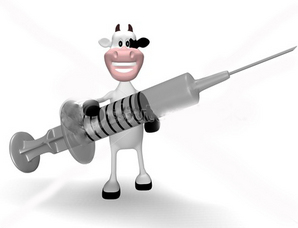 What if a vaccine made it so any vector that bit you died? You’d be a walking bednet, or better, and it would cut down on the need for other interventions.
What if a vaccine made it so any vector that bit you died? You’d be a walking bednet, or better, and it would cut down on the need for other interventions.
I’ll admit it, I’m on the pan-vector vaccine bandwagon. I am also currently obsessed with the role of cows in malaria transmission. (Which is a weird thing to say, since cows don’t get or transmit malaria. They are essentially big undefended bags of blood = mosquito food).
Vector vaccines would be an awesome tool to add to the arsenal against vector transmitted parasites, but they have issues. The likelihood that a single vaccine would work against all vectors is like expecting a single vaccine to work against all parasites. There are plenty of other problems too, like figuring out how to amp up the immune system without causing an allergic reaction in the host, or giving any parasites that the vector is carrying a leg up, making potential infections much worse. Check out the latest Trends in Parasitology review (with a great title) by the fantastic Mary Ann McDowell.
Another great vector biologist, Brian Foy, ivermectin specialist, and his group put out this article on a channel (AgGluCl) they’ve found in mosquitoes from which an antibody insecticide/vaccine can be made. The antibodies an animal (rabbit was injected with surface proteins from the channel in their experiments) makes against these proteins kills mosquitoes. The journal picked up on the headliner future potential of this work in this piece, from which I’ve plucked the paragraph below.
“Having shown that antibodies targeted to AgGluCl in blood meals can be effective insecticides, Meyers and Foy are keen to find out if antibody-laced blood meals are equally deadly in real life. ‘The next step… is to immunize cattle against the AgGluCl antigen and directly feed A. gambiae on the immunized cattle in the lab’, explains Meyers. And if the strategy proves successful, Meyers envisages a large scale cattle immunisation program as part of a combined attack on the parasite. ‘Cattle are a major blood meal source for multiple malaria vectors,’ he says, explaining that any malaria-harbouring mosquito that consumed blood carrying the toxic antibodies during the malaria parasite’s incubation period would die, disrupting transmission of the disease and offering hope of a malaria-free future for generations to come.”
This only reinforces my stance that the solution to the problem of malaria lies with cows and vectors. I’d love to hear what you all think!
(Title inspired by Andrew’s recently suggested reading).
